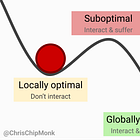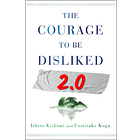It can be extremely valuable to view emotional issues as having an immediate payoff. For example, depression, anxiety, insecurity, failure at work, failure in romance, muscle tension, chronic pain, etc. can help one avoid fears or achieve unconscious goals.
But very few people seem to consider that, and instead most people assume that emotional issues are all bad.
Unfortunately, taking the concept of trauma too seriously can lead to more trauma.
1. Emotional issues often have an immediate payoff
UPDATE: Better explanations:
2. But very few people understand this.
UPDATE:
3. Taking the concept of trauma too seriously can lead to more trauma.
If you believe that you were permanently damaged by something in your past, then you might not even try, resulting in the ‘damage’ becoming permanent as you worried.
For example, just before my depression I also had a string of social failures. If I had interpreted these failures as trauma that caused my depression, then I might not have tried to improve my situation. After all, other people had caused my depression — so other people would have to stop it, right? Out of my hands!
But ultimately my depression was not solved by anyone else changing.
So I’m wary of the common trauma mindset. When taken to the extreme, it disqualifies the potential for personal agency. It can even help exacerbate issues.
The most mentally unhealthy people I know also tend to believe that growth will be slow and difficult. And maybe they’re right about their situation… but it seems to me like a better mindset would be “I just haven’t found the right combination of facilitator and method for my case yet.”
Thanks to Stag Lynn, Kaj Sotala, Damon Sasi, Claire Mingyuan Wang, Epistea Residency, CFAR, Anna Salamon, Alex Zhu, and Max.






actually, the only book I brought with me to the bay area was "The courage to be disliked". I think inverted causality is a useful frame to avoid the psychoanalytic doom spiral. I also like the idea that the self is constructed instrumentally by the conscious mind, which this post sort of hints at too.
Digging deep into internal issues can be insightful, but I've found that a radically optimistic approach works wonders. Start my day by saying, "I am happy, great, and confident," 50 times and that's like a 10x coffee